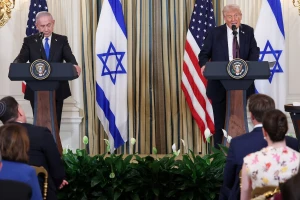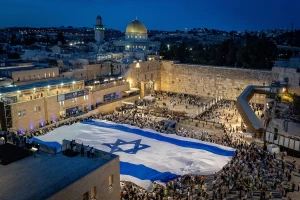Israel continues to await Hamas' response to Trump’s peace plan as terrorists signal they want more time
Divisions within Hamas, as well as with other terror groups, are delaying a response

Five days after U.S. President Donald Trump presented his new plan for ending the Gaza War, Israel continues to wait for the terror group Hamas’ response, the Prime Minister’s Office (PMO) confirmed with The Times of Israel on Friday.
Israeli Prime Minister Benjamin Netanyahu publicly committed to accepting the outline earlier this week. “We don’t have an assessment regarding what their answer will be,” the PMO stated.
On Tuesday, Trump said he would grant the terror group "three or four days" to respond to his proposal.
Meanwhile, the Israel Defense Forces is continuing to push ahead with its offensive that aims to capture the Gaza Strip.
Over the past few days, numerous reports citing various Hamas officials have offered conflicting information about whether the terror group intends to accept or reject the proposal.
One relatively consistent point across these reports is that Hamas is unlikely to give a definitive answer and will instead seek to prolong negotiations without committing either way.
On Friday, an unnamed Hamas official was cited by the AFP as saying that Hamas needs more time.
“Hamas is still continuing consultations regarding Trump’s plan… and has informed mediators that the consultations are ongoing and need some time,” the official said.
An informed source told The Times of Israel on Thursday that Hamas would respond “positively” but would submit a series of amendments to the original outline.
According to Kan News, Hamas fears the IDF will continue to conduct strikes in Gaza even after an agreement is signed, similar to the situation in Lebanon, and is therefore seeking stronger guarantees for a ceasefire.
Other amendments could involve “technical” issues that require more time than the plan currently allows, such as the release of the Israeli hostages, which is mandated to take place within 72 hours.
Another factor that could delay a response is the divide between Hamas’s military leadership in Gaza and its political leadership abroad, most of whom are based in Qatar.
The Saudi newspaper Al‑Sharq Al‑Awsat reported that Hamas’ Gaza-based leaders authorized the external leadership to draft a “suitable response.”
Sources added that, within Hamas, there is a tendency to “engage as positively as possible with the proposed plan, aiming to stop the fighting in the Strip, bring about an Israeli withdrawal, and open crossings without restrictions.”
The BBC reported that Izz al-Din al-Haddad, Hamas’ most senior military commander still alive, is resisting the proposed plan to end the war, viewing it as a strategy aimed at dismantling the organization.
Senior Hamas leaders also allegedly oppose the introduction of an international force, as “a new form of occupation.”
In addition to internal divisions within Hamas, the group faces opposition from the other Palestinian terror groups, many of which have publicly rejected the plan outright.
On Thursday, Abd al‑Rahman Shadid, a senior Hamas official, said the Trump plan doesn’t address Hamas as an organization, but rather “all Palestinians” – their rights, and their future, the Palestinian news network Quds reported.
Shadid vowed there would be a “highest-level patriotic response,” declaring that no one would be able to impose “twisted plans” on the Palestinians or their factions.
Mahmoud al-Hindi, deputy leader of the Palestinian Islamic Jihad, the second most powerful terror group in Gaza, told Al Jazeera on Thursday: “We will not agree to surrender our weapons, but we are open to a de-escalation within the framework of a limited agreement.”
The mediating countries have indicated that additional negotiations will be necessary, even though U.S. officials have described the proposal as a “take it or leave it” offer. President Trump himself said there would be “little” room for further negotiations.
Egyptian Foreign Minister Badr Abdelatty stated that the plan requires more time for discussions on its implementation, especially regarding governance in the Gaza Strip and future security arrangements, according to Qatar’s Al-Araby channel.
Abdelatty said, “Trump’s plan is full of loopholes that need to be sealed, and it can only be implemented if there is good and shared will to do so.”
“If Hamas rejects Trump’s plan, the situation will become difficult and escalation may occur,” Abdelatty told the Saudi Al-Hadath channel.
The Lebanese newspaper Al-Akhbar, which is affiliated with Hezbollah, reported that Qatar, Egypt and Turkey are pressuring Hamas to accept the agreement.

The All Israel News Staff is a team of journalists in Israel.
You might also like to read this:











